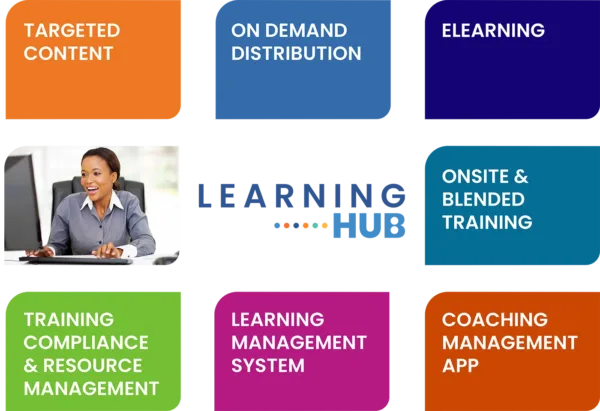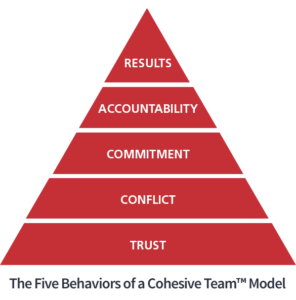PROFESSIONAL DEVELOPMENT
World class executive development for leaders of today and tomorrow.
Today’s companies require leaders who have high performance skills, inspire others, and help organizations grow.

Professional Development Courses On Demand
Many companies realize that to survive in today’s volatile, uncertain, complex, and ambiguous (VUCA) environment, leaders need skills beyond those that have helped them succeed in the past. This top collection of self-paced, on demand learning programs is designed for senior executives and those looking to encompass emotional/cognitive skills as well as organizational/management skills.
Module 1
Know Yourself First
It’s critical to understand how your management strengths and challenges are impacting those you lead.
At the end of this module, you will be clear about your unique management style and how you naturally interact with others.
You will discover:
- How the 4 different behavioral styles in the workplace respond to different motivators.
- What’s important to you as a manager, and how other styles are responding to you now.
- Your management strengths, challenges, motivators, and stressors as a manager.
- Receive specific tips for working with your own manager’s style preferences, and what you need to do to gain your manager’s buy-in.
You will receive:
- Everything DiSC® Management Profile: Learn about your natural tendencies as a manager and how you can use that knowledge when leading others.
- Working with Your Manager Report: Identify specific techniques to build better rapport with your manager and gain his or her support.
- Leadership Development Plan: Articulate your action items for applying everything you learn in this course into the Leadership Development Plan. We will begin it in this module and build on it as we continue through the course.
Module 2
Adapt your Style to Others
Learn how to better communicate with, develop, and motivate your staff.
Employees are sending us messages all the time about their own style, what motivates them, and what their hot buttons are. With this module, you’ll learn how to recognize the signals.
You will discover:
- The two questions that will help you quickly and easily identify the DiSC® style of any other person, so that you will know how you need to lead them differently.
- Your natural approach to the key actions you must take to lead and manage your team: Directing, Delegating, Motivating, and Developing others. Knowing your tendencies will help you identify your strengths and development needs and how you can be most effective.
- What specific techniques you must use to adapt to each employee’s DiSC® style. You’ll gain confidence in your ability to read people and know how to respond to them differently.
You will receive:
- Your own personalized Reference Guide to lead others more effectively. This Guide provides specific tips and techniques based on your natural tendencies and the style of the person you are leading.
- A Motivation Report. This Report identifies the type of environment you naturally create around you and learn the strategies for motivating each unique employee you lead.
Module 3
Managing Performance Discussions
Learn how effective coaching can increase employee ownership and productivity.
Your ability to address performance problems in a way that motivates the employee, while also changing and improving performance, is an essential skill many managers don’t have.
You will discover:
- The one Foundational Principle that is your strongest tool to engage your staff.
- The three Power Skills that help you communicate with clarity while building rapport at the same time.
- How the 7 Step Performance Coaching Process generates employee buy-in and desire to improve for almost any situation you encounter.
- How to incorporate the Key Communication Skills into the 7 Step Process to ensure optimum clarity and receptivity.
- How to effectively address resistance, conflict and defensiveness during the coaching conversation.
You will receive:
- Your Own Personalized Reference Guide to Lead Others More Effectively. This Guide provides specific tips and techniques based on your natural tendencies and the style of the person you are leading, as follows:
- Directing and Developing Report. This will show you how to adapt your approach to someone when they have more experience, or less experience, based on their DiSC® style.
- Ideas for Showing Appreciation Guide with generous suggestions to inspire and motivate your staff.
- Performance Discussions Planning Guide to help prepare for and implement highly effective coaching sessions in the future.
- 7 Step Performance Coaching Implementation Planner, to help you prepare for and implement highly effective coaching sessions in the future.
- Skill Practice video simulation exercise to apply the 7 Step coaching model.
- Tip sheet for adapting the coaching discussion with each DiSC® style to develop trust, enhance rapport and encourage superior performance.
Module 4
Performance Management
Learn how targeted coaching tied to annual goals can exponentially improve results.
Most managers know they need establish goals and turn in annual performance reviews, but coaching throughout the year towards those goals is usually the weakest, yet most important link.
You will discover:
- One simple step the majority of managers overlook that impacts your employee’s performance the most.
- How to encourage employee buy-in and ownership during each phase of the performance management cycle.
You will receive:
- Your Own Personalized Reference Guide to Lead Others More Effectively. This Guide provides specific tips and techniques based on your natural tendencies and the style of the person you are leading.
- Developing Others Report
Learn the advantages and disadvantages of your unique approach to developing others, with specific strategies for developing each employee most effectively. - 3-Step Coaching Process for Year-Long Performance Management
with specific steps for coaching and communication during all phases of the performance management cycle.
A shortened version of Understanding Behavioral Styles for Managers. In this course you will reinforce your understanding of your own behavioral style and use this knowledge to enhance your communication skills and increase your productivity.
Audience:
- Leaders/Management Professionals
- Sales Professionals
- Customer Service/Care Professionals
- Anyone familiar with Behavioral Styles that wants to refresh their understanding (See the full Understanding Behavioral Styles course for details)
Lessons:
- Recognizing Behavioral Styles
- Improve Your Performance
- Reading and Reacting to People
- Practical Application of Knowledge
A Knowledge Assessment to be taken at the end of the course. You will receive a Certificate of Completion after completing the assessment.
The purpose of this course is to make the interviewing process easier, more effective, and to provide you with the tools you need to ask the right questions to better discover if your candidate is the right person for the job.
Audience:
- Managers
- Team Leaders
- Coaches
- Sponsors
- Anyone who interviews potential job candidates
Lessons:
- Questions
- Sample Behavioral Questions
- The Interview Process
- Fair and Legal Questions Quiz
- Practical Application
There is a Knowledge Assessment to be taken at the end of the course. You will receive a Certificate of Completion after completing the assessment.
This course provides a process to help managers have a discussion with an employee when performance needs to improve. Key communication skills are addressed, as well as a step-by-step outline for conducting the discussion in a way that respects the individual, and encourages him or her to take responsibility for improving performance.
Audience:
- Managers
- Team Leaders
- Coaches
- Sponsors
- Anyone needing to council others on performance
7 Lessons:
- Introduction
- Overview of Managing Performance Discussions
- Describe Specific Behavior and Outcomes – Key Communication Skills
- Use Effective Questioning Skills – Key Communication Skills
- Use Listening Skills – Key Communication Skills
- Seven-Step Process
- Practical Application
There is a Knowledge Assessment to be taken at the end of the course. You will receive a Certificate of Completion after completing the assessment.
Understanding Behavioral styles shows you how to recognize different behavior patterns, and develop adaptive skills that increase your ability to communicate successfully with others.
Managerial relationships often depend on adapting your managerial style. Being able to quickly recognize a person’s behavioral style and interact appropriately are critical to this process. Understanding Behavioral Styles shows you how to recognize different behavior patterns, and develop adaptive skills that increase your ability to communicate successfully with others.
Audience:
- Leaders/Management Professionals
- Anyone wishing to communicate more effectively with co-workers
Lessons:
- Introduction
- Different Behavioral Styles
- The Four Behavioral Styles
- Recognizing Behavioral Styles
- Behavioral Styles and Listening
- Improve Your Performance
- Reading and Reacting to People
- Determining Behavioral Styles
- Practical Application of Knowledge
A Knowledge Assessment to be taken at the end of the course. You will receive a Certificate of Completion after completing the assessment.
In this online self-paced “Coaching” course we will identify and practice five (5) keys to your coaching success. It offers several important coaching tips. Through exercises and case studies you will learn practical coaching skills and when to use them.
Audience:
- Managers
- Team Leaders
- Coaches
- Sponsors
- Anyone needing to coach others
Lessons:
- Introduction
- Coaching and Counseling
- Five Keys to Coaching Success
- Advanced Concepts
- Coaching and Counseling Case Studies
There is a Knowledge Assessment to be taken at the end of the course. You will receive a Certificate of Completion after completing the assessment.
You’ll review the strategies behind some common negotiation tactics and learn to recognize the pitfalls that you can avoid.
You’ll realize there is no need to fear or to glamorize negotiating. It is nothing more than the process you use to reach agreement with another.
You’ll practice an effective negotiation process that will help you and the other party get to a win/win. If your goals include a mutually beneficial long-term relationship, this course can help you get there.
Audience:
- Managers/Leaders
- Managers needing to negotiate
Lessons:
- Introduction
- Negotiation Strategies for Managers
- Negotiation and Behavioral Styles
- Preparing for Conducting Negotiations
- Finding the Win-Win
There is a Knowledge Assessment to be taken at the end of the course. You will receive a Certificate of Completion after completing the assessment.
This on-demand course will walk you through how to manage your time better. The agenda includes: Prioritizing, Planning, Goal Setting, Delegation, Conquering Procrastination and Action Planning.
Audience:
- Managers
- Team Leaders
- Coaches
- Anyone who needs to manage their time better
Modules:
- Key Time Management Strategies
- Download: Time Management Reference Templates
- Download: Productivity Tips
- Listen: Time and Priority Management Radio Show
- To-Do: Time Management Action Plan
You will receive a Certificate of Completion after completing the course.
This on-demand course will give you how to steps for effective Meeting Management.
Audience:
- Managers
- Team Leaders
- Coaches
- Anyone who conducts meetings
Modules:
- How to Steps for Effective Meeting Management
- Download: Meeting Management Template Resources
- Download: Meeting Management Action Plan
You will receive a Certificate of Completion after completing the assessment.
Professional Development Virtual Instructor-Led Courses
Combine expert training instructors with online delivery for individual or group training sessions.
In recent years, one of the most significant advancements in learning and development has been the widespread adoption of Virtual Instructor-Led Training (VILT). NexaLearning is at the forefront of this trend, offering a diverse range of comprehensive VILT programs tailored to meet the training needs of employees across various work environments. Our VILT courses come in varying lengths and cover a wide array of subjects, with the option of including an online self-assessment profile. Upon request, we provide sample profile reports, course flyers, and detailed course descriptions to help you make informed decisions about your training needs. Additionally, if you are looking to empower your team by certifying your own facilitator we offer Train-the-Trainer programs designed to equip your staff with the skills and knowledge needed for effective facilitation.
Courses that Include Online Self-Assessment Profile
Each of the following programs is greatly enhanced by enabling each participant to complete an online self-assessment profile as pre-work. There is a different profile for each course listed, based on the topic.
Our live instructor-led virtual training sessions are 90 minutes in length, unless otherwise identified. For those interested in certifying their own facilitator, our Train-the-Trainer programs are also available.
Profile: Everything DiSC Workplace Profile
Successful interpersonal relationships often depend on “getting off on the right foot.” Being able to quickly recognize someone’s behavioral style and interact appropriately is critical to this process. This course helps participants quickly recognize someone else’s behavioral style and develop adaptive skills that increase one’s ability to communicate effectively with others. This program uses the DiSC model to understand behavioral styles.
Topics addressed include:
- Characteristics of each of the 4 behavioral styles
- Recognizing other’s behavioral styles
- How to adapt your approach to other people
- Practical application exercises
The Everything DiSC Workplace Profile enables each participant to identify their own behavioral style strengths and development needs.
The four styles are:
- Dominance
- Influence
- Steadiness
- Conscientious

The profile also addresses the primary tendencies of the participant’s behavioral style pattern. The end of the profile lists all behavioral style patterns and can be used as a reference guide when adapting styles to the needs of others.
Profile: Personal Listening
Research shows that people screen out or change the intended purpose of what they hear in over 70% of all communications. The biggest factor contributing to such miscommunications is our listening approach.
Topics addressed in this course include:
- Listening vs. Hearing
- Communication Filters
- The Focus, Motivation and Behavioral Indicators of each listening approach
- How to use listening approaches appropriate to the situation
- Developing effective listening strategies, based on the purpose of the communication
The Learning to Listen Profile is designed to help you gain insight into your behaviors as a listener.
Profile: Thomas Kilmann Conflict Mode Indicator
One of the key reasons for lack of productivity is interpersonal conflict. It slows down the decision-making process and prevents people from willingly sharing information. It also inhibits the opportunity for synergistic creativity and innovation.
There are five specific methods for dealing with conflict addressed in this program, such as:
- Competing
- Accommodating
- Avoiding
- Collaborating
- Compromising
Topics include:
- Causes for conflict
- The need for flexibility in response to conflict situations
- When each approach is useful and when it is not
This program utilizes the on-line Thomas Kilmann Conflict Mode Instrument to help each participant identify his or her primary approach to conflict and recognize when each approach is most effective.
Profile: Emotional Intelligence Assessment
Emotional Intelligence (EQ) is the ability to comprehend your emotions and manage them effectively. Research shows that people who show high levels of emotional intelligence skills are stronger leaders, better decision makers, foster better relationships, and increase team efficiency in the workplace.
It also suggests that EQ is a more accurate predictor of success at work and in life than the more traditional IQ test.
Each participant in this course will receive a personalized Emotional Intelligence Skills Assessment.
This instrument measures adult emotional intelligence on five scales: Perceiving, Managing, Decision Making, Achieving, and Influencing.
Learning Outcomes
- Discover the major components of emotional intelligence
- Recognize the behaviors and characteristics of an emotionally intelligent person
- Identify areas where emotional intelligence skills can be applied
- Evaluate personal strengths and growth opportunities
- Generate action steps to improve emotional intelligence and success
Profile: Negotiating Style Profile
Everybody negotiates. And whether people are striving to hit their monthly sales quota, campaigning for a deadline extension, or pitching ideas to a team, the same principles apply. There’s more to effective negotiating than the outcome alone. In fact, building productive relationships is equally important. Skillful negotiators know this is the key to their success – and it’s what sets them apart from the rest.
Each participant in this course will receive a personalized Negotiating Style Profile, which offers a simple framework for determining one’s preference for one of five negotiating styles: Defeating, Accommodating, Collaborating, Withdrawing, or Compromising.
Learning Outcomes
- Learn five styles of negotiating
- Identify your personal negotiating style
- Learn how one’s negotiating style is perceived by others
- Develop an action plan to improve negotiating-style strengths

Profile: VIA Me Strengths Assessment
When people identify and then use their personal character strengths at work, they are happier and more productive. Research shows that using your character strengths can help you:
- Buffer against, manage and overcome problems
- Improve your relationships
- Enhance health and well-being
This course utilizes the VIA Me! Report from that VIA Institute on Character. It vividly captures and details your signature strengths. The course provides tips and techniques for opportunities to use those strengths at work.

Profile: What’s My Learning Style? Assessment
Every person uses a preferred personal learning style during the learning process, whether or not they are conscious of it. Some people learn best in a group, while others prefer to learn independently. Some approach learning with enthusiasm; some require time for reflection. There isn’t one “correct” learning style but building awareness of your own learning preferences can help develop the ability to function in a variety of different learning situations.
During this program, participants will:
- Identify a preference for one of 4 learning styles
- Recognize the strengths and weaknesses of each learning style
- Discover how to approach all types of learning in a way that is comfortable
- Create a plan to branch out of the “style comfort zone”
Profile: Five Behaviors Personal Development
This program teaches individuals to become better teammates by integrating the behaviors defined in Patrick Lencioni’s best-selling book “The Five Dysfunctions of a Team”. Participants do not need to be part of an intact team. This session is appropriate to anyone who desires to improve their team member skills.
The Five Behaviors Personal Development Profile helps each team member learn about their own approach and create an action plan to improve in each of the five behaviors listed below:
- Trust One Another
- Engage in Conflict Around Ideas
- Commit to Decisions
- Hold one Another Accountable
- Focus on Achieving Collective Results

Courses that Do Not Include Online Self-Assessment Profile
Each of the following instructor-led virtual courses are 60 minutes in length and do not include a profile.
Effective communication skills are a key ingredient for successful career development. When they are strong, relationships are built with other colleagues and productivity is enhanced. When they are lacking, they are the primary reason for conflict and dissatisfaction at work. This course addresses 4 fundamental skills necessary for communicating effectively with others, as follows:
- Showing appreciation for other’s efforts
- Focusing on specifics to enhance clarity
- Using effective questioning techniques to explore ideas
- Listening effectively to promote understanding
This program offers a straightforward, easy-to-follow process designed to improve the way you make business decisions or any decision that can help you reach your goal. Our decisions and choices shape our professional and personal lives. Sadly, decision-making is seldom taught as a skill in its own right. This course will present a clear process and user-friendly techniques for making smart choices.
Topics addressed include:
- How to frame the decision
- Gathering information
- Analyzing the information
- Why bad things happen
- Making the decision
Most people are not overtly prejudiced and, if asked, would claim in all sincerity that they believe everyone is equal. However, despite people’s good intentions, unconscious bias shows itself in several subtle ways. Bias becomes unproductive when we allow it to control our decision making without questioning our assumptions, or to impact our behavior towards others.
Topics addressed include:
- How to understand the subtle ways that bias occurs
- Identifying instances of devaluing others through small, subconscious behaviors and micro-inequities
- How to establish a framework to increase inclusion at the organizational level
- Recognizing different ways of conveying respect
- How to lead by example and be part of the solution

One of the most effective ways to help employees succeed is to help them create clear goals, and then coach them throughout the year towards achieving it. However, all too often, goals are not well-defined and consistent coaching does not occur.
Topics addressed in this course include:
- Understanding the Performance Management Cycle
- The difference between creating Standards and Objectives
- Identifying S.M.A.R.T. goals
- How to conduct Progress Reviews
- How to conduct Performance Appraisals

Research shows that happy employees are more productive, more creative, and more engaged at work. They also enjoy better relationships, can better manage problems, and enjoyed an enhanced sense of health and well-being. There are many tactics each individual can use to improve their happiness at work every day and experience all the benefits of improved happiness.
Topics addressed include:
- Latest research about the power of happiness at work
- 7 specific strategies for increasing happiness you can implement now
- Why knowing your key strengths can improve happiness
- How to use your strengths at work
- Tools and resources that improve happiness
This course contains information for accessing a free Strengths Assessment to learn more about your personal strengths.
Facilitator Certifications
There are many certification programs available if you would like to become certified to deliver our courses internally. Take advantage of decades of experience and certified trainers.
Facilitator Certification is available for all courseware developed by NexaLearning.
This includes:
- The Foundations of Leadership Program
- The Leadership Excellence Program
- All of the Course Topic listed in the Course Offering Catalog
Everything DiSC Workplace® Certification is your best resource to gain foundational knowledge and tools for facilitating Everything DiSC®. Designed with your busy schedule in mind, this online course gives you the flexibility of self-paced learning, paired with live-collaborative sessions led by Wiley’s expert trainers.
This intensive in-person course begins with online pre-work, culminating in two days of practical application facilitated by Wiley’s expert trainers in the Education Center in Minneapolis, MN.
The program includes:
- Four modules of self-directed and live collaborative learning (each requiring 3-5 hours of time per week), conducted over a 4 week period.
- Active knowledge checks to help participants assess how well they understand the content, and to improve learning and retention.
- Final Certification Exam (self-directed/graded activity).
You can gain certification in the Everything DiSC Workplace® Program through self-directed learning and virtual collaborative sessions. This program is provided in smaller increments over a 4-week timeframe.
Learners will:
- Gain expertise in the Everything DiSC® model and supporting research.
- Demonstrate the ability to use the Everything DiSC Workplace® reports.
- Experience customized programming, and how to customize programming, to meet specific participant needs.
- Navigate challenging scenarios that could arise during a workshop or coaching session.
- Create strategies to promote a DiSC® based culture.
- Explore My Everything DiSC® and discover how to utilize it as an ongoing development tool.
Not sure which program is right for you?

We believe in the power of people, and it shows.
Toll Free: +1 (800) 683-0681
NEW YORK OFFICE
112 W. 34th Street 18th Floor
New York, NY 10120
PHILADELPHIA OFFICE
1515 Market Street, Suite 1200
Philadelphia, PA 19102
NORTH CAROLINA OFFICE
6801 Pleasant Pines Drive, Suite 103
Raleigh, NC 27613
ARKANSAS OFFICE
2928 McKee Circle, Suite 123
Fayetteville, AR 72703
IOWA OFFICE
3020 Jordan Grove
West Des Moines, IA 50265
SOUTH CAROLINA OFFICE
808 Lady Street
Suite D-20
Columbia, SC 29201
TRAINING NETWORK/TRAINERY
6801 Pleasant Pines Drive, Suite 103
Raleigh, NC 27613
800.397.5215


